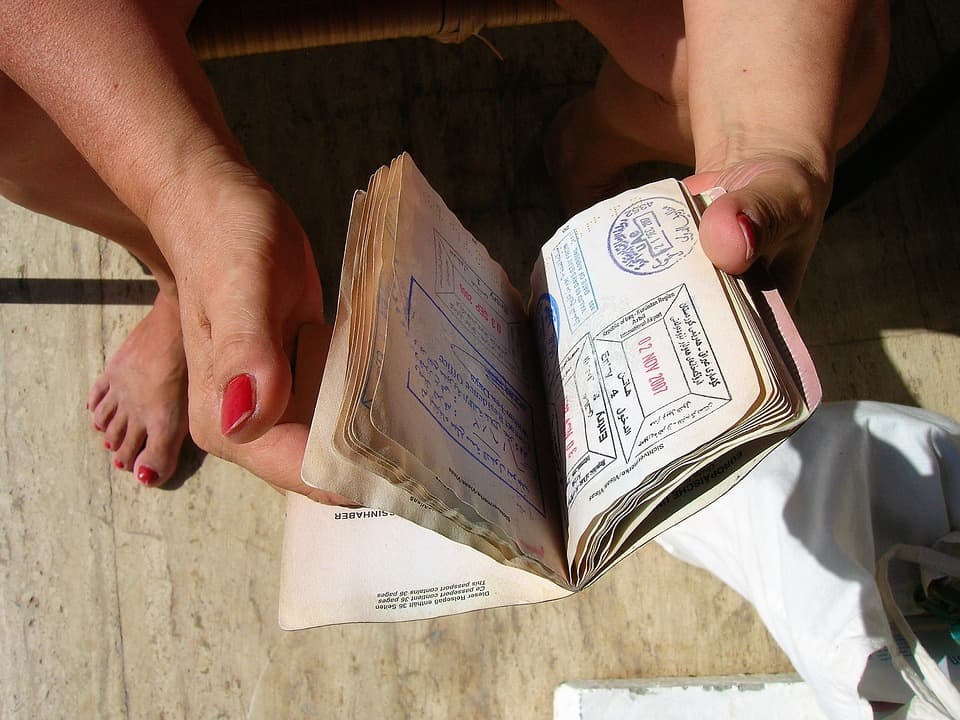Every two or three weeks, we see an excited post blathering on about how there’s going to be a “digital nomad visa” for such and such a place.
In fact, because Chiang Mai is considered a “nomad hotspot” – it often centers around Thailand. Then, a few weeks later all the excitement turns to disappointment. Here’s why:
There is never going to be a digital nomad visa. Never. And this isn’t bad news. In fact, the vast majority of digital nomads wouldn’t want one if it was to be made available. Let’s take a quick look at this and see why we ought to be grateful rather than sad about this.

Table of Contents
Why There Will Never Be A Digital Nomad Visa
Digital nomads keep approaching visas from a point of what they think is their own interest. It goes like this; “If I move to another country, don’t take a job away from a local and spend my money there – I am doing them a favor, right? They ought to be delighted to have me and give me a visa.”
The trouble is that this is a load of tosh from the perspective of the people who issue visas. They don’t care about the way digital nomads perceive themselves, they care about two things: 1.) the amount of work involved in any given thing and 2.) the profitability for their country.
Immigration law rarely hands out visas, anywhere in the world, because people want them. They do it because it brings some sort of benefit to the host nation.
Existing Visas Matter: A Worked Example (Thailand)
Now, let’s take a look at a specific example and given that Thailand is often the source of “digital nomad visa” rumors, we’ll take Thailand.
Short-Time Visa Options

If you want to stay in Thailand for a short period of time – this is for a period of less than a year – then you can basically do this on tourist visas and visa exemptions with the occasional border run thrown in.
Thailand is cracking down on the use of tourist visas for long-term stays but you’re going to have no problem making a year before you need another solution.
So, given this (and the fact that nearly everyone on earth can get a tourist visa for Thailand) there is already a visa option for those who want to say in the country short-term that is easily accessible. There’s no need for a short-term digital nomad visa. Just be a tourist.
Long-Time Visa Options
Now, if you want to stay for longer than a year in Thailand, the first thing we need to point out is that you’re no longer a nomad. Settling down is fine but the moment you stop traveling, you stop being a digital nomad. So, really anybody looking for a “digital nomad visa” for this length of time is fooling themselves.
Then there’s the enormous number of options that you can avail yourself of to stay in Thailand for a longer period of time:
- The Education Visa – sign up to learn self-defense (Chiang Mai only), languages or anything at a university and you can get an education visa for 1 year (which can be renewed) and the cost usually works out at about $1,000/year and that includes tuition. Downside? Got to go to classes, slightly more expensive than a tourist visa. Upside? You’ll learn new skills and still be under the taxman’s radar.
- The IGLU sponsored work visa – for digital nomad freelancers earning more than $2,000 a month. There’s the service provided by IGLU. You can go completely legal and stay in Thailand as long as you like. As long as you pay tax and a service fee that is. That’s 30% a month. It’s pretty reasonable, and you do get a co-working desk and health insurance thrown in as a benefit too.
- The investment visa – buy a property or sink money into a company. The exact numbers vary but $100,000-$200,000 invested in something in Thailand is usually enough to get you a permanent visa.
- The Elite visa – got plenty of cash and don’t want a property. Spend $60,000 and get 20-years of access to Thailand with the Thai Elite Visa. They throw in, golf, massages, free limo rides from the airport, fast track access at immigration and a government helpline. While that figure may take your breath away $3,000 a year is not bad. It’s $4,200 a year cheaper than using IGLU, right?
- The retirement visa – if you are over 50, you can always retire in Thailand. Stick $30,000 in a Thai bank account (and no, you can’t spend it if you want to keep your visa) and get a 10-year retirement visa.
There are also various other specialist schemes for staying in Thailand. You could even get an actual job and get sponsored in too.
So:
- There is absolutely no shortage of legal options for staying in Thailand for a long time. Why do digital nomads need something different?
There’s only one answer to this – they can’t afford any of the long-term options to stay in Thailand. This is quite problematic for the visa-issuing authorities. You see, the reason that these options exist is that they all bring a decent amount of cash into the Thai economy.
ED-visas discourage working while you’re here because they’re time intensive. The work visa means you pay taxes. The investment visa also sees a nice chunk of change thrown at the taxman. The Elite visa is pure cream for the government. The retirement visa has a handy $30,000 guarantee that you’re going to pay most of your medical bills if you get sick.
What incentive is there to offer another route to long-stay which results in a lower level of benefit to Thailand? None. Whatsoever.
The only valid option for a digital nomad visa for the Thai authorities is one in which the digital nomad pays tax. They already have that option and yet IGLU’s own figures show that only about 300 digital nomads in Thailand have chosen to do so.
We completely understand why but let’s be frank – less than 300? That’s a problem in its own right too.
It’s also worth remembering that Thailand is not a special case. Nearly every country on earth has options for permanent or long-term immigration. If digital nomads don’t like what’s on offer – it nearly always boils down to money.
Interlude: There Is No Grey Area

One thing we need to make clear because of the enormous amount of rubbish talked about visas on digital nomad forums is this: there is no grey area; unless your visa specifically allows you to work in a country (or you have another legal right to work there) then working is illegal.
It does not matter if you’re not taking work from locals. It does not matter if you’re paid overseas. There are no loopholes. If you don’t have the right to work – working is illegal.
Having said this: most countries are never going to check whether you are working and as long as you keep moving around and act sensibly (don’t boast about working illegally, for example) nobody is likely to give you any hassle as a digital nomad.
Digital Nomad Numbers: The Big Lie
The only thing that might offset the fact that a digital nomad visa would be less appealing from a tax perspective than existing options is if there were so many digital nomads that the reduced upside was still a major upside.
There aren’t.
You will see endless figures of pure delusion on how many digital nomads are out there. When, in fact, this is what is really out there:
- Tons of wishful thinkers. These people would love to be digital nomads as long as they either had the money or the courage to do so. Sadly, most of them will never have either. They make up 90%+ of the people in every digital nomad group online. They are also partly the reason that digital nomads are seen as pure fools by many serious businesspeople.
- Holidaymakers. “I was a digital nomad for 2 weeks.” We’re not going to point out how ludicrous this claim is we’re just going to point out that these people arrive, act like idiots for a fortnight and then go home. A good 50%-75% of “digital nomads” in real life are these people.
- Broke nomads. Chiang Mai attracts very few nomads with money. (Those IGLU numbers are a good indicator of this and don’t forget their numbers are split between several locations in Thailand – they’re not just for Chiang Mai). Most of them are desperately trying to work out “how to live like a king on $300 a month”. This group almost always leaves within a year when they work out it can’t be done.
- A handful of professional digital nomads. These people are in hiding. They are chased from every digital nomad group online for daring to point out the realities of traveling and working at the same time. They, mainly, don’t fit the common profile of nomads and tend to be Western men in their 30s and up. This is the only group that it makes financial sense to woo with a digital nomad visa.
In fact, while the Chiang Mai digital nomads Facebook group may boast 10’s of thousands of members. In reality, there are probably no more than 2,000 digital nomads, from all the categories above, in the city at any given time. Often, there are far, far fewer than this. And that’s all the digital nomads in the “biggest nomad hub in Asia”.
Create a new visa for less than 2,000 people who don’t want to spend any money? Not going to happen.
The Upside For Digital Nomads

Actual digital nomads will have noticed something – none of this is a big deal.
If you travel regularly (and if you don’t, you’re not a nomad) then you can live on tourist visas in South East Asia forever.
A lack of a digital nomad visa means no harassment at immigration and no real need to declare yourself a digital nomad and pay taxes.
It also means that despite the hype – you’re still in a pretty exclusive club. People who work and travel are not legion, at least, not yet.
Conclusion
There will never be a digital nomad visa. It doesn’t make any sense to issue a digital nomad visa for the issuing authorities. Real digital nomads, those who work and travel, will be very happy about this.
The frustrated low-rent expat, on the other hand, is going to have to think about where they want to live, very carefully, indeed as visa regimes aren’t usually run for the benefit of those seeking a visa.
